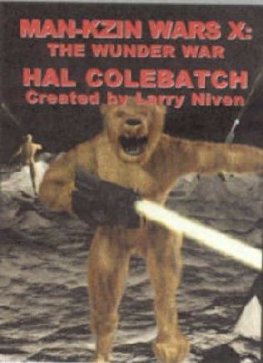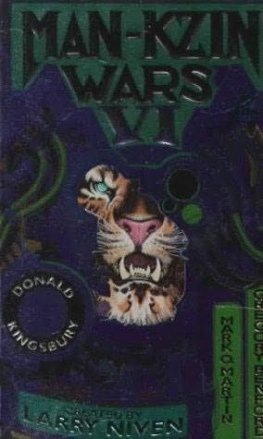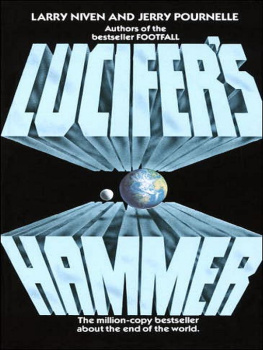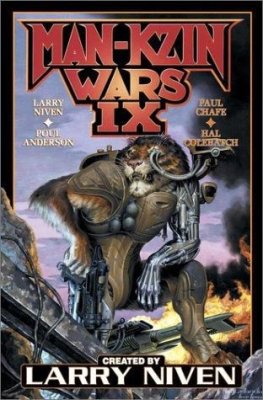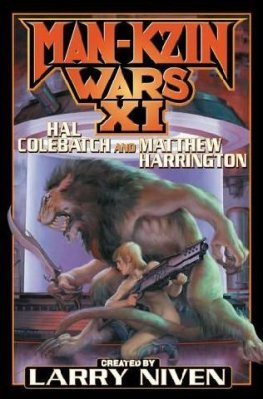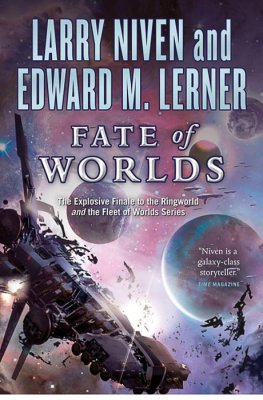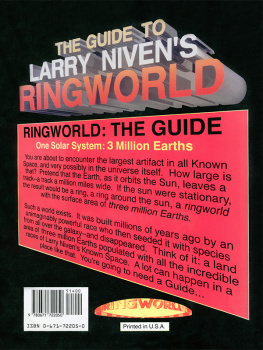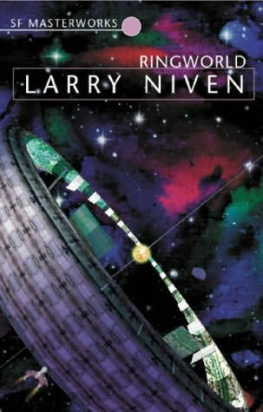Larry Niven - The Ringworld Engineers
Here you can read online Larry Niven - The Ringworld Engineers full text of the book (entire story) in english for free. Download pdf and epub, get meaning, cover and reviews about this ebook. year: 1980, publisher: Holt, Rinehart and Winston, genre: Science fiction. Description of the work, (preface) as well as reviews are available. Best literature library LitArk.com created for fans of good reading and offers a wide selection of genres:
Romance novel
Science fiction
Adventure
Detective
Science
History
Home and family
Prose
Art
Politics
Computer
Non-fiction
Religion
Business
Children
Humor
Choose a favorite category and find really read worthwhile books. Enjoy immersion in the world of imagination, feel the emotions of the characters or learn something new for yourself, make an fascinating discovery.

- Book:The Ringworld Engineers
- Author:
- Publisher:Holt, Rinehart and Winston
- Genre:
- Year:1980
- ISBN:0-030-21376-2
- Rating:3 / 5
- Favourites:Add to favourites
- Your mark:
- 60
- 1
- 2
- 3
- 4
- 5
The Ringworld Engineers: summary, description and annotation
We offer to read an annotation, description, summary or preface (depends on what the author of the book "The Ringworld Engineers" wrote himself). If you haven't found the necessary information about the book — write in the comments, we will try to find it.
The Ringworld Engineers — read online for free the complete book (whole text) full work
Below is the text of the book, divided by pages. System saving the place of the last page read, allows you to conveniently read the book "The Ringworld Engineers" online for free, without having to search again every time where you left off. Put a bookmark, and you can go to the page where you finished reading at any time.
Font size:
Interval:
Bookmark:
The Ringworld Engineers
by Larry Niven
Dedication
Ringworld is ten years old; and I have never stopped getting letters about it. People have been commenting on the assumptions, overt and hidden, and the mathematics and the ecology and the philosophical implications, precisely as if the Ringworld were a proposed engineering project and they were being paid for the work.
A man in Washington, D.C., sent me a full proofreading job on the first edition of Ringworld, with the title The Niven-McArthur Papers, Vol. I. It was of enormous help to me. (If you own a first paperback edition of Ringworld, its the one with the mistakes in it. Its worth money.)
A Florida high school class determined the need for the spillpipe system.
From a Cambridge professor came an estimate for the minimum tensile strength of scrith.
Freeman Dyson (Freeman Dyson!) has no trouble believing in the Ringworld (!), but cant see why the engineers wouldnt have built a lot of little ones instead. Wouldnt it be safer. I hope the answer Ive given in this book is satisfactory.
Of course there are no petrochemicals on the Ringworld. Frank Gasperik pointed out that any civilization at our level would be based on alcohol. The Machine People would be able to use the vegetable sludge for other purposes, up to and including a plastics industry.
During a speech in Boston someone in the audience pointed out that, mathematically, the Ringworld can be treated as a suspension bridge with no endpoints. Simple in concept; harder to build.
From all directions came news of the need for attitude jets. (During the 1971 World Science Fiction Convention, MIT students were chanting in the hotel hallways: THE RINGWORLD IS UNSTABLE!) but it took Ctein and Dan Alderson, working independently, several years to quantify the instability. Ctein also worked out data on moving the Ringworld.
Dan Alderson was kind enough to work out the parameters for the Ringworld meteor defense for me and that was the only piece of information I actually solicited.
You who did all that work and wrote all those letters: be warned that this book would not exist without your unsolicited help. I hadnt the slightest intention of writing a sequel to Ringworld. I dedicate this book to you.
PART ONE
Chapter 1 Under The Wire
Louis Wu was under the wire when two men came to invade his privacy.
He was in full lotus position on the lush yellow indoor-grass carpet. His smile was blissful, dreamy. The apartment was small, just one big room. He could see both doors. But, lost in the joy that only a wirehead knows, he never saw them arrive. Suddenly they were there: two pale youths, both over seven feet tall, studying Louis with contemptuous smiles. One snorted and dropped something weapon-shaped in his pocket. They were stepping forward as Louis stood up.
It wasnt just the happy smile that fooled them. It was the fist-sized droud that protruded like a black plastic canker from the crown of Louis Wus head. They were dealing with a current addict, and they knew what to expect. For years the man must have had no thought but for the wire trickling current into the pleasure center of his brain. He would be near starvation from self-neglect. He was small, a foot and a half shorter than either of the invaders. He
As they reached for him Louis bent far sideways, for balance, and kicked once, twice, thrice. One of the invaders was down, curled around himself and not breathing, before the other found the wit to back away.
Louis came after him.
What held the youth half paralyzed was the abstracted bliss with which Louis came to kill him. Too late, he reached for the stunner hed pocketed. Louis kicked it out of his hand. He ducked a massive fist and kicked at kneecap, kneecap (the pale giant stopped moving), groin, heart (the giant bent far forward, with a whistling scream), throat (the scream stopped suddenly).
The other invader was on hands and knees, breathing in sips. Louis chopped at his neck, twice.
The invaders lay still in the lush yellow grass.
Louis Wu went to lock his door. At no time had the blissful smile left his face, and it did not change when he found his door fully locked and alarmed. He checked the door to the balcony: bolted and alarmed.
How in the world had they gotten in?
Bemused, he settled where he was, in lotus position, and did not move again for over an hour.
Presently a timer clicked and switched off the droud.
Current addiction is the youngest of mankinds sins. At some time in their histories, most of the cultures of human space have seen the habit as a major scourge. It takes users from the labor market and leaves them to die of self-neglect.
Times change. Generations later, these same cultures usually see current addiction as a mixed blessing. Older sins alcoholism and drug addiction and compulsive gambling cannot compete. People who can be hooked by drugs are happier with the wire. They take longer to die, and they tend not to have children.
It costs almost nothing. An ecstasy peddler can raise the price of the operation, but for what? The user isnt a wirehead until the wire has been embedded in the pleasure center of his brain. Then the peddler has no hold over him, for the user gets his kicks from house current.
And the joy comes pure, with no overtones and no hangover.
So that by Louis Wus time, those who could be enslaved by the wire or by any lesser means of self-destruction had been breeding themselves out of the human race for eight hundred years.
Today there are even devices that can tickle a victims pleasure center from a distance. Tasps are illegal on most worlds, and expensive to make, but they are used. (A dour stranger wanders past, rage or misery written in the sour lines of his face. From behind a tree you make his day. Plink! His face lights up. For a moment hes got no worries at all ) They dont generally rain lives. Most people can take it.
The timer clicked and switched off the droud.
Louis seemed to sag in upon himself. He reached across his smooth scalp to the base of the long black braid, and pulled the droud from its socket beneath the hair. He held it in his hand, considering; then, as always, he dropped it into a drawer and locked it. The drawer disappeared. The desk, which seemed a massive wooden antique, was actually paper-thin hullmetal, with endless room for secret compartments.
It was always a temptation to reset the timer. Hed done it routinely in the early years of his addiction. Neglect had made of him a skeletal rag doll, constantly dirty. Finally he had gathered what remained of his ancient dogged determination, and he had built a timer that took twenty minutes of nitpicking concentration to reset. On its present setting it would give him fifteen hours of current and twelve hours for sleep and for what he called maintenance.
The corpses were still there. Louis had no idea what to do about that. If hed called the police immediately, it would still have attracted unwanted attention but what could he tell them now, an hour and a half late? That hed been knocked unconscious? Theyd want to deep-radar his head for fractures!
This he knew: in the black depression that always followed his time under the wire, he simply couldnt make decisions. He followed his maintenance routine like a robot. Even his dinner was preprogrammed.
He drank a full glass of water. He set the kitchen. He went to the bathroom. He did ten minutes of exercise, pushing himself hard, fighting depression with exhaustion. He avoided looking at the stiffening corpses. Dinner was ready when he finished. He ate without tasting and remembered that once he had eaten and exercised and made every move with the droud set in his skull, delivering a tenth of normal current to the pleasure center. For a time he had lived with a woman who was also a wirehead. They had made love under the wire and played war games and held pun contests until she had lost interest in everything but the current itself. By then Louis had regained enough of his natural caution to flee Earth.
Font size:
Interval:
Bookmark:
Similar books «The Ringworld Engineers»
Look at similar books to The Ringworld Engineers. We have selected literature similar in name and meaning in the hope of providing readers with more options to find new, interesting, not yet read works.
Discussion, reviews of the book The Ringworld Engineers and just readers' own opinions. Leave your comments, write what you think about the work, its meaning or the main characters. Specify what exactly you liked and what you didn't like, and why you think so.

